Tired of plain water?
We’re supposed to take in so much water a day.
Some say 8 glasses.
Some say it depends on your weight.
Some say to look at the color of your pee. That it should be light yellow.
Ayurveda says, drink when you’re thirsty, and don’t drink when you’re not. This is assuming you’re healthy and able to listen to your body’s cues.
Whatever convention you subscribe to, the question that often follows is,
Does it have to be straight water?
The answer is no.
It can include anything that contains water, including soups and veggies.
But if you’re going to stick to drinks for your fluid intake considerations, or follow Ayurveda’s eat when you’re hungry, drink when you’re thirsty guideline, then it’s good to have some healthy drink options on hand when water isn’t cutting it.
Before we get into it, I do want to give a shout out to water, in a very specific way:
***Hot water***
I can often be seen with my blue Hydroflask, which keeps my water hot for many hours, the way people have their cell phones in hand. I sip from it throughout the day. Ayurveda’s guideline is to take 2-3 sips per half hour. It keeps my digestion working, my mind clear, and my emotions balanced (it’s very soothing).
Hot water detoxes the body and creates a relaxed-energized state of mind.
Ayurveda has a deep detox program called panchakarma. Stay with me here. It consists of 5 methods to eliminate toxins from the body and purify the mind. It’s a complete mental and physical reset. It boosts the immune system, speeds up metabolism, and decongests the entire body. People have said that they feel 10 years younger after going through panchakarma. In the U.S., it’s expensive, costing thousands of dollars. The cost of it in India is significantly cheaper… but you’d have to go to India to get it done.
Why am I even telling you this?
Says Dr. John Peterson, MD, and one of the first U.S. medical doctors to be accepted by Maharishi as a student of Ayurveda: the next best thing is the hot water sip.
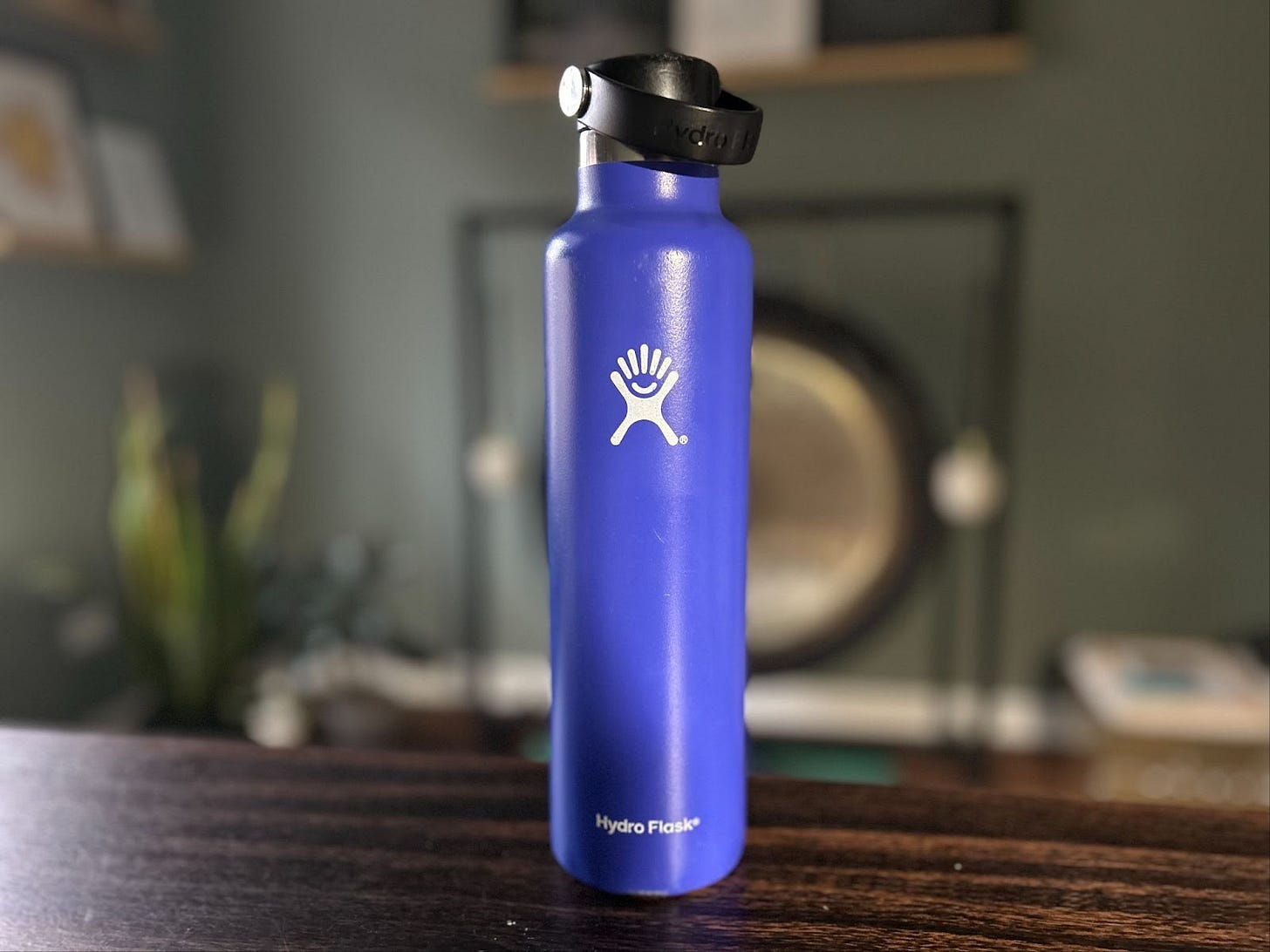
How to maximize the health benefits of water
Do NOT chug water. It can lead to overhydration, or water intoxication, where the electrolytes, particularly sodium in the blood, get too low. It also dilutes the enzymes in your body, overwhelming your digestive system. It’s best to sip water throughout the day. 2-3 sips of hot water per half hour.
Drinking water room to hot temperature promotes sipping instead of chugging. It also supports good digestion. Cold water does the opposite. Hot water detoxifies the body, soothes the nervous system, clears congestion, calms the mind, relieves stiffness, and increases positive emotions.
It’s best to sit while drinking. According to Ayurveda, drinking standing up disrupts the digestive system.
Now that I’ve given hot water the proper spotlight, on to the alternatives!
What I’ve listed below can be consumed room to hot temperature. I will not be going into juices and smoothies today.
Here are 8 healthy water alternatives.
Heads up: I’m going to share some brands that I use because I love and trust them… and people ask. I am not an affiliate of any of these brands (who knows, maybe one day).
Unfiltered, organic Apple Cider Vinegar (ACV): 1 tsp in an 8 oz glass of water
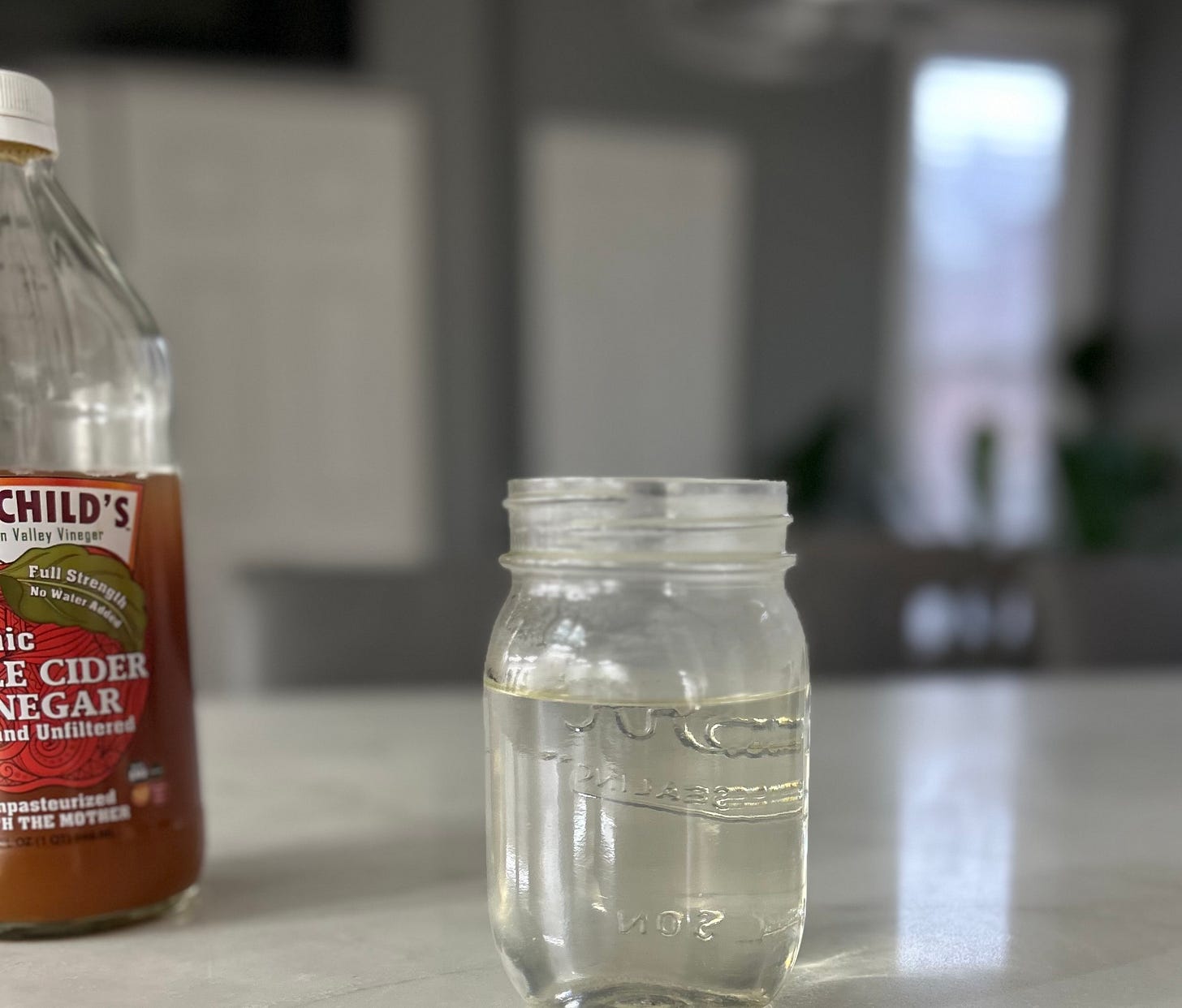
Fairchild’s ACV is organic, unfiltered, and undiluted. I add one tsp to a cup of room temperature or warm water.
I drink this first thing in the morning.
Why? Oh, let me count the ways…
It is considered the cure-all for all issues:This first reason is very popular right now: ACV slows down the absorption of carbs improving insulin response and lowering blood sugar levels. It increases the feelings of fullness. For weight loss, you’d add 1-2 T to an 8 oz glass. For regular maintenance, 1 tsp per glass.
It lowers cholesterol. It helps the liver remove toxins and fat.
It’s good for gut health: it contains enzymes to stimulate your digestive fire and break food down more effectively. It soothes digestive issues.
It can soften the skin. Some people use it, diluted, as a daily face wash, toner, and treatment for spots, wrinkles, acne, and sunburn.
It’s good for hair: it strengthens it, promotes hair growth, makes it shinier and smoother, and reduces dandruff.
It softens and hydrates the stool.
It dissolves uric acid crystals, which can lead to gout, kidney stones, and irregular lumps underneath the skin.
It boosts immunity.
It kills bad bacteria, fungus, and other infections. It can clear sinuses.
It creates an acidic environment to ward off germs, making it good for gargling with for sore throats, AND it alkalizes the stomach, making it good for nausea. And because it alkalizes the body, research says it may inhibit the growth of some cancer cells.
It contains trace amounts of magnesium, potassium, sodium, calcium, iron, phosphorous, Vitamins B and C, and contains good bacteria (depending on the quality of the ACV).
It’s anti-inflammatory.
It contains polyphenols which act as an antioxidant and supports brain function.
I’m sure I can keep going and take this all the way to z.
Make sure you choose a high quality ACV that is:
-Certified organic: apples are on the “dirty dozen” list of the most heavily sprayed fruit.
- Raw and unpasteurized: heat kills the enzymes (and we want the enzymes).
- Undistilled because distilled is refined (processed). Undistilled ACV contains the “mother”, which is the cloudy substance floating around in the jar that’s made up of beneficial bacteria and yeast.
- Undiluted: because cost matters. Pay for the concentrate, use your own water. Which is why I use Fairchild’s ACV. Bragg’s is fine, but it’s diluted.
Lassi: is an excellent digestive, it promotes gut health, which translates to overall health. It contains electrolytes, so it’s an excellent form of hydration. It’s good for heart, bone, and skin health.
It boosts immunity, regulates blood sugar levels, and reduces inflammation. It’s a good source of calcium, Vitamin D, B12, and protein. Because it’s rich in probiotics, it’s good to enjoy when on antibiotics to replace the lost good bacteria.
Ayurvedically, the ideal way to take in the benefits of yogurt is diluted in water, which is lassi. It makes it lighter and more digestible. It has a cooling effect on the body.
I enjoy mine at room temp right after lunch. I fill my single serving mason jar 1/4 to 1/3 of the way up with Greek yogurt and the rest with water. I sweeten with honey, add a pinch of cardamom, and when I have it, I also add rosewater. I cap my jar (see below) with a lid and shake it until it foams, and then enjoy, usually after lunch. When I make this in a larger, open container, I aerate it with a whisk. The yogurt to water ratio is 1:4 or 1:3.
I use Greek yogurt. It has more protein and less carbs and sugar than regular yogurt. And I like the rich flavor and texture of greek yogurt.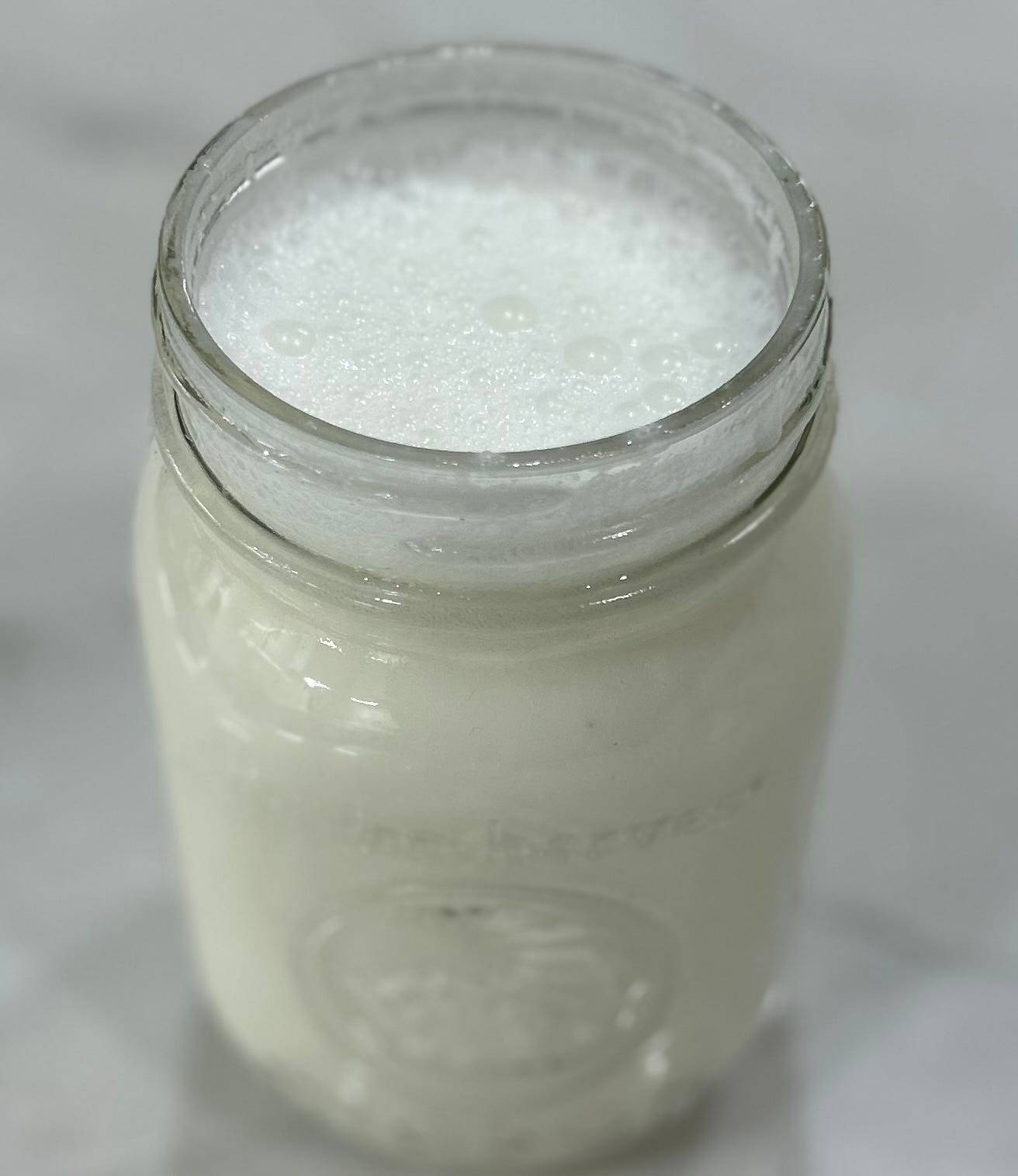
Fill your 8 oz glass 1/3 of the way up with yogurt and the rest with water. Sweeten with honey or maple syrup. I also add pinch of cardamom and some rose water. Cap and shake well or aerate with whisk until foamy on top. Golden Milk:
This drink is incredibly soothing and a good one to enjoy in the evening. With the main ingredient being turmeric, it’s anti-inflammatory, neutralizes free radicals, and is good for the heart. It helps promote good digestion and skin health and is beneficial for allergies, anxiety, and depression. It’s delicious and soul soothing.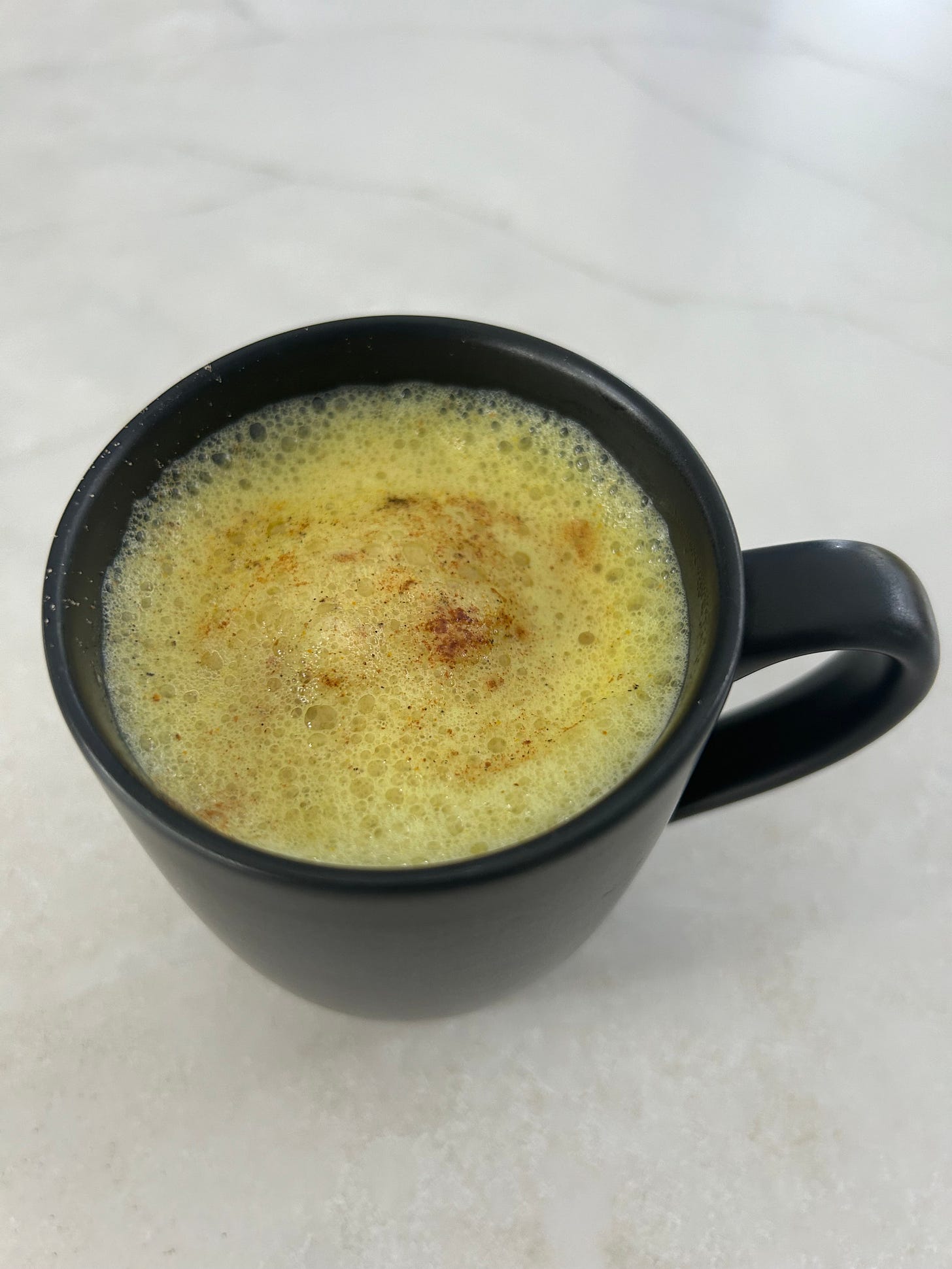
Golden Milk: 1/2 tsp of turmeric powder to 1 cup of milk. Optional adds: cardamom, cinnamon, cracked pepper. Pour and sweeten with honey or maple syrup. Recipe:
Add ½ tsp of turmeric powder to
1 cup of your favorite milk (I use organic almond)
Optional adds: a pinch of cardamom powder, cracked pepper, ginger or cinnamon powder. Each has their own unique health benefits.
Whisk or froth these two ingredients as you heat, and then pour into a mug.
Then add honey to sweeten to your preference (there are so many benefits to raw honey; just don’t cook it and turn it into a toxin). Maple syrup is a good option if you’re vegan.
Stir and enjoy!
Mud/wtr: is a brand of “coffee alternative” made with mostly medicinal mushrooms, an adaptogen that I use to boost my immune system. I very much love this mug of mud and enjoy it almost every morning around 10 am.
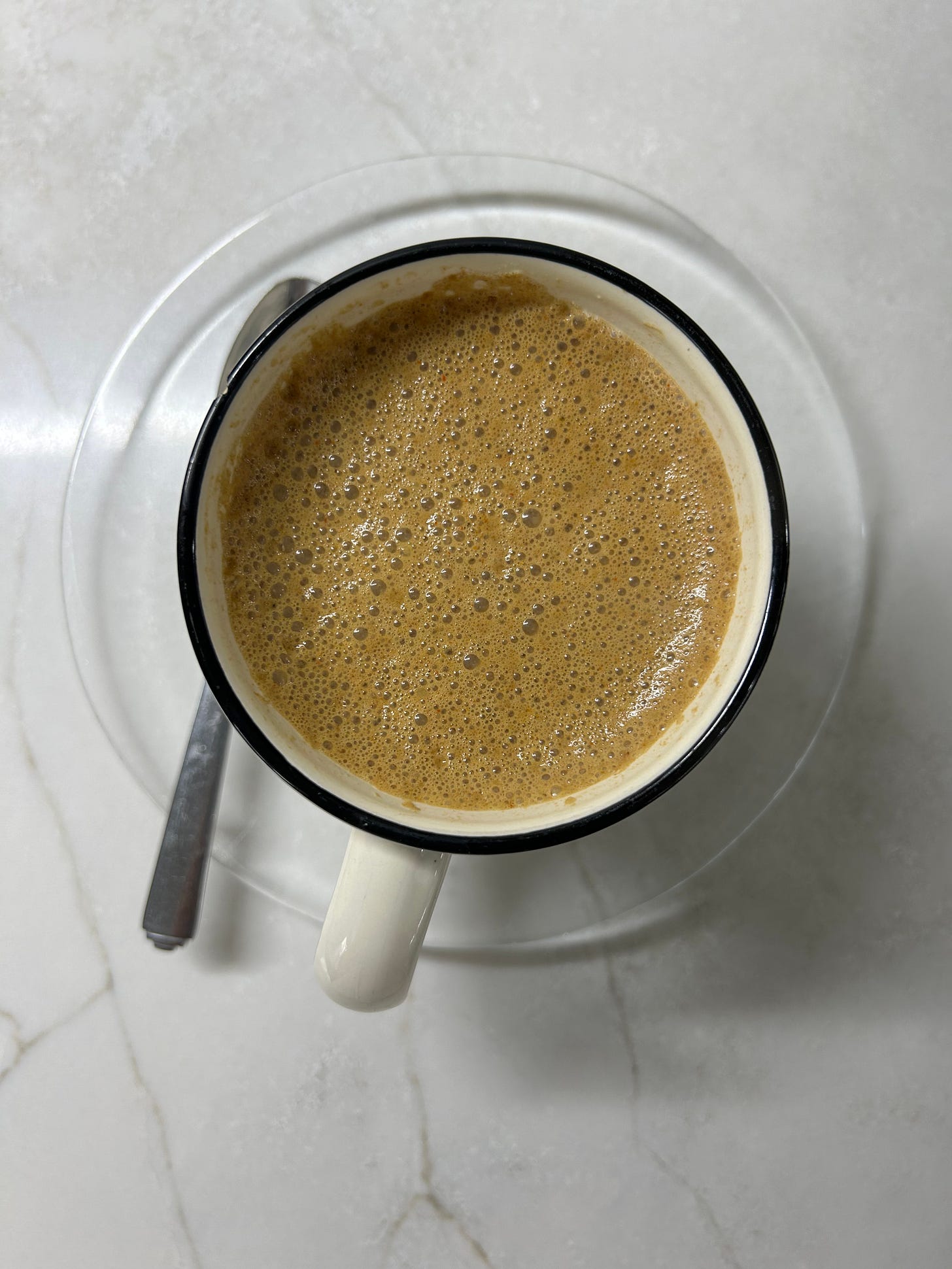
Froth one scoop of Mud/Wtr and one scoop of MCT powder to your favorite milk. I sometimes add a dash of cayenne. Bring to almost a boil and then cook on medium heat for a few more minutes.
Adaptogens come in the form of mushrooms, plants, or herbs, and they help reduce stress and bring balance back to the body.
Medicinal mushrooms are antioxidants that boost immunity, lower cholesterol, increase cognitive function, reduce inflammation, and improve gut health. The Chaga mushroom is known to inhibit cancer growth, and sometimes even kills the cancer cells.
My TCM (Traditional Chinese Medicine) doctor gave me this chart below. The arrows are what my doctor wanted me to look for to improve my immunity. The dashes you see below the chart, under Key Codes, are the mushrooms contained in MudWtr.
While I love mushrooms, I can only have so much, and not every day. Which is why I started drinking this almost daily as my first substantive cup of joy.
I heat almond milk with a scoop of Mud/Wtr’s Masala Chai (they have a non-caffeinated option called Rise, which I haven’t tried). I add a scoop of their MCT powder, and a dash of cayenne. I froth it and let it cook for several minutes. It’s amazing.Ginseng: makes for a nice morning or afternoon ‘coffee’. It boosts energy and stamina without the caffeine.
It supports cognitive function like memory and focus. According to NIH National Library of Medicine, ginseng is “effective in memory improvement, and in the direct prevention of degenerative brain diseases such as Alzheimer's disease. The neuroprotective effect of ginseng may be useful in the prevention of depression.”
It strengthens immunity; it detoxes the body and fights against infections.
It protects the nervous system.
It’s an adaptogen, which means it helps you cope with stress.
It regulates blood sugar levels, promotes heart health, reduces inflammation, and is good for digestion and menstrual cramps.
I drink Korean red ginseng, which is the most potent type of ginseng.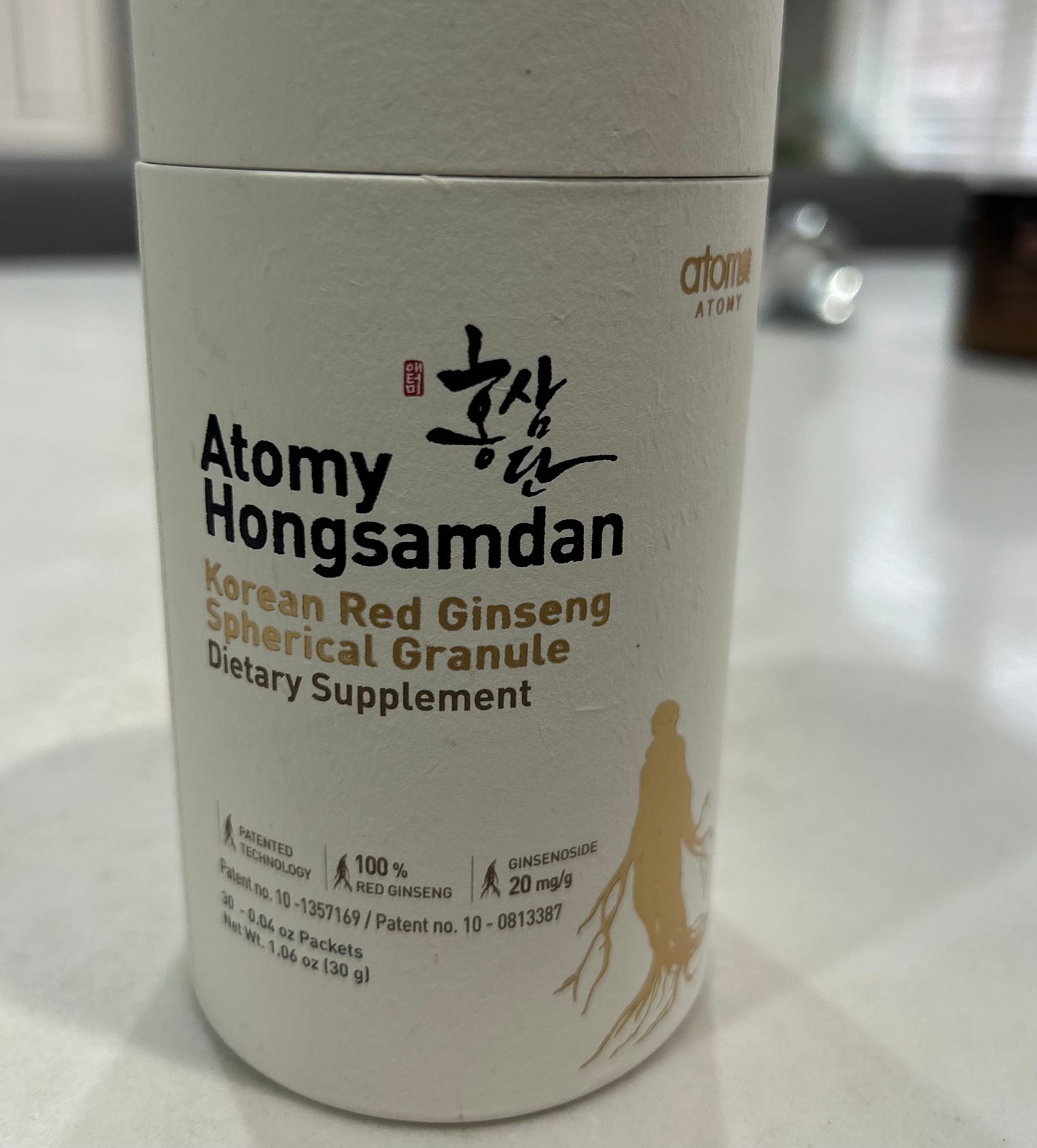
This particular brand tastes amazing unsweetened and comes in single serving packs, making it great for traveling. Just add hot water. Magnesi-Om: Magnesium soothes the nervous system and keeps you regular. I drink this when needed, often when I’m traveling or going through big transitions: it alleviates stress and digestive sluggishness.
In Chinese Medicine, magnesium is called MEI, which means “the beautiful mineral,” because this electrolyte is essential for good health. It…
- Plays an important role in the nervous system and brain health as well as in mood regulation.
- It’s good for the circulatory system.
- Promotes calm and better sleep, cools hot emotions, and provides energy.
- Supports muscle function.
- Promotes blood sugar levels.
Magnesium deficiency is linked to anxiety and panic attacks and increased risk of migraines, PMS, asthma, metabolic syndrome, and depression.
Some symptoms of magnesium deficiency are muscle cramps, feelings of weakness, fatigue, anxiety, irritability, bone pain, sweet cravings, nausea, constipation, heart palpitations.
Magnesium is most easily depleted by eating processed and refined foods, and drinking too much coffee. Also by stress, prescription drugs, and alcohol.
Food sources are dark leafy greens, beans, and nuts like almonds and cashews. Some say that taking it in through the skin is best (I have a magnesium spray that I spray around my joints from time to time and I love it). But if you are stressed and your bowels are negatively affected, you might try taking this (image below) as a drink. It’s cleaner than the popular brand Calm that you see at the supermarkets.Be careful not to take too much, it can compete with calcium absorption and damage the kidneys… and give you the runs… This said, we need a healthy balance of magnesium and calcium: when magnesium is too low, the calcium gets into the mitochondria and calcifies it. This situation is implicated in brain-related diseases like Parkinsons and MS. Magnesium, then, also helps with hardened arteries and prevention of cataracts (calcium in the lens).
Tea: I always keep a few herbal and caffeinated teas in my pantry. Tea is gifted with many benefits. It can boost immunity, cognitive function, digestion, and cardiovascular health. It can promote weight loss, liver health, and benefit blood sugar levels.
I know that some people find tea boring. If this is you, give it another shot. Try a cup after dinner. Hot, not iced. Straight, without sugar or milk. It’s soothing to the digestion and to your soul. Part of the reason, of course, is that you are allowing yourself to sit and relax with a cup of tea after dinner rather than popping out of your seat to rush to the next thing. It’s a sweet ritual in self love and celebration of good company, even if it’s with yourself.
There are so many tea options out there. Choose one without artificial flavors. Just the tea leaves please!
I’m currently in love with herbal teas from TeaLeaves.com, especially Peppermint and Relax. They make for wonderful evening, post-dinner sips. For black tea, I love Oolong and Jasmine, great for after breakfast or lunch. A friend loves TeaLeaves’ Earl Grey Lavender, which is on my list to try soon.Broth
You can also drink a simple miso, chicken, veggie, or bone marrow broth with a few or no veggies. This is not a great image, but here’s one of red miso with a little bit of kimchi and sesame seeds I enjoyed one day from a mug.
On Coffee
Coffee is my dessert.
There are so many to choose from. Just get a clean one, one that is free from contaminants like mold, pesticides, and other impurities. Look for beans that are lab tested, biodynamically, or organically grown.
Avoid decaf! The chemicals used to remove the caffeine are harmful, especially this solvent called methylene chloride, a neurotoxin used industrially for paint stripping, evidently banned by the EPA but still allowed to be used in the removal of caffeine by the FDA (wtf).
I don’t recommend starting your day with coffee. It creates a dependency to start the day with artificial energy that ultimately takes more from you than it gives. Enjoying it as a dessert after lunch doesn’t carry the same addictive effect.
Coffee is linked to some health benefits, but I’m not going to list any here because the benefits outweigh the negative effects of daily consumption, especially if you drink more than one cup a day. And I want you to know that I love coffee, so I’m not judging :).
Enjoy it in moderation as a treat!
My big recommendation here is to not use it to wake up.
Final Thoughts
We as a Western society have a bad habit: we find out something is good for us and then take too much of them. We take them in the form of food, drink, and supplement.
For instance, we once learned that Asians experience better health overall than Americans, and saw that they include soy, like miso and tofu, in their diet. So we started having tofu, soy burgers, soy milk, and all sorts of processed soy products. And then soy consumption started to become a problem said to negatively impact our health.
It’s not the soy. It’s the overconsumption and the processing.
Don’t do that. Don’t start overdosing on magnesium, ginseng, and lassi. A little goes a long way. With everything.
Enjoy your abundance of options with divine pleasure. Divinity doesn’t need much. Just a mugful, just a spoonful, just a sip.
Listen to your body.
To your health and hydration, with love,
Savitree
P.S. If you try any of these out, or enjoy other healthy water alternatives, please share! I’d love to hear about them.

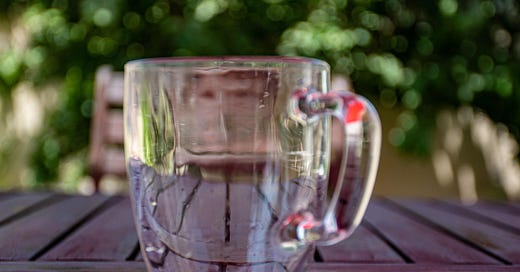




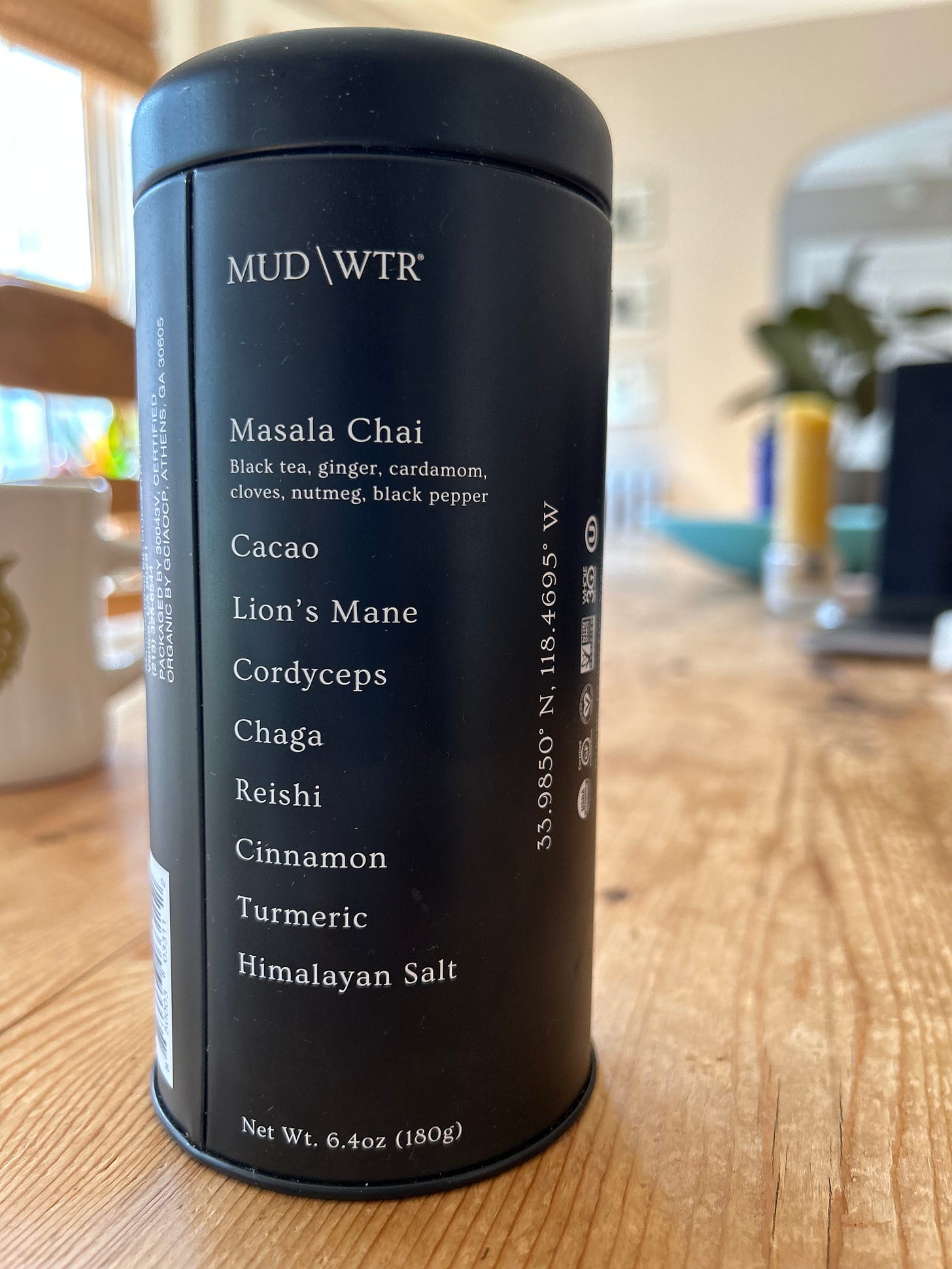
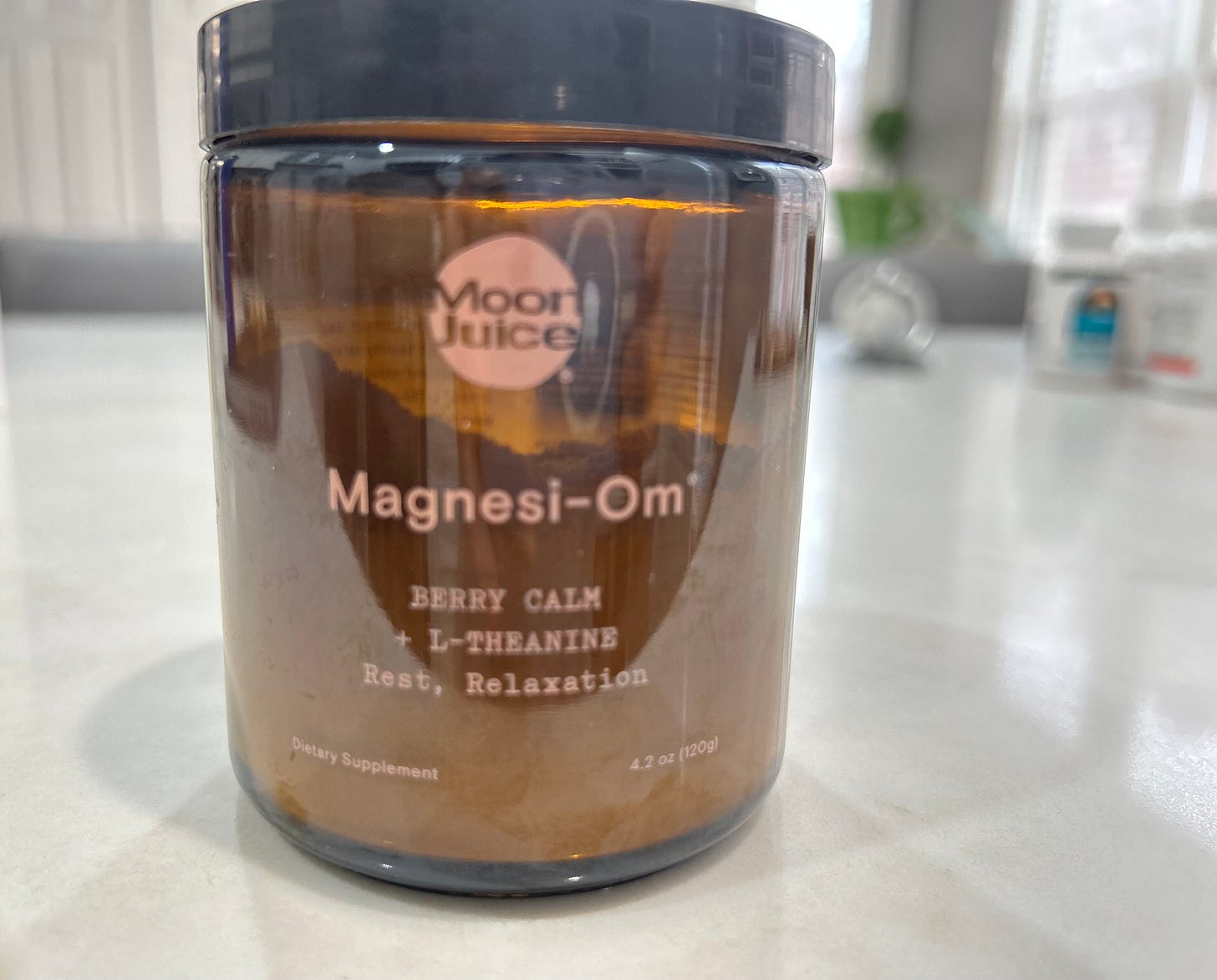
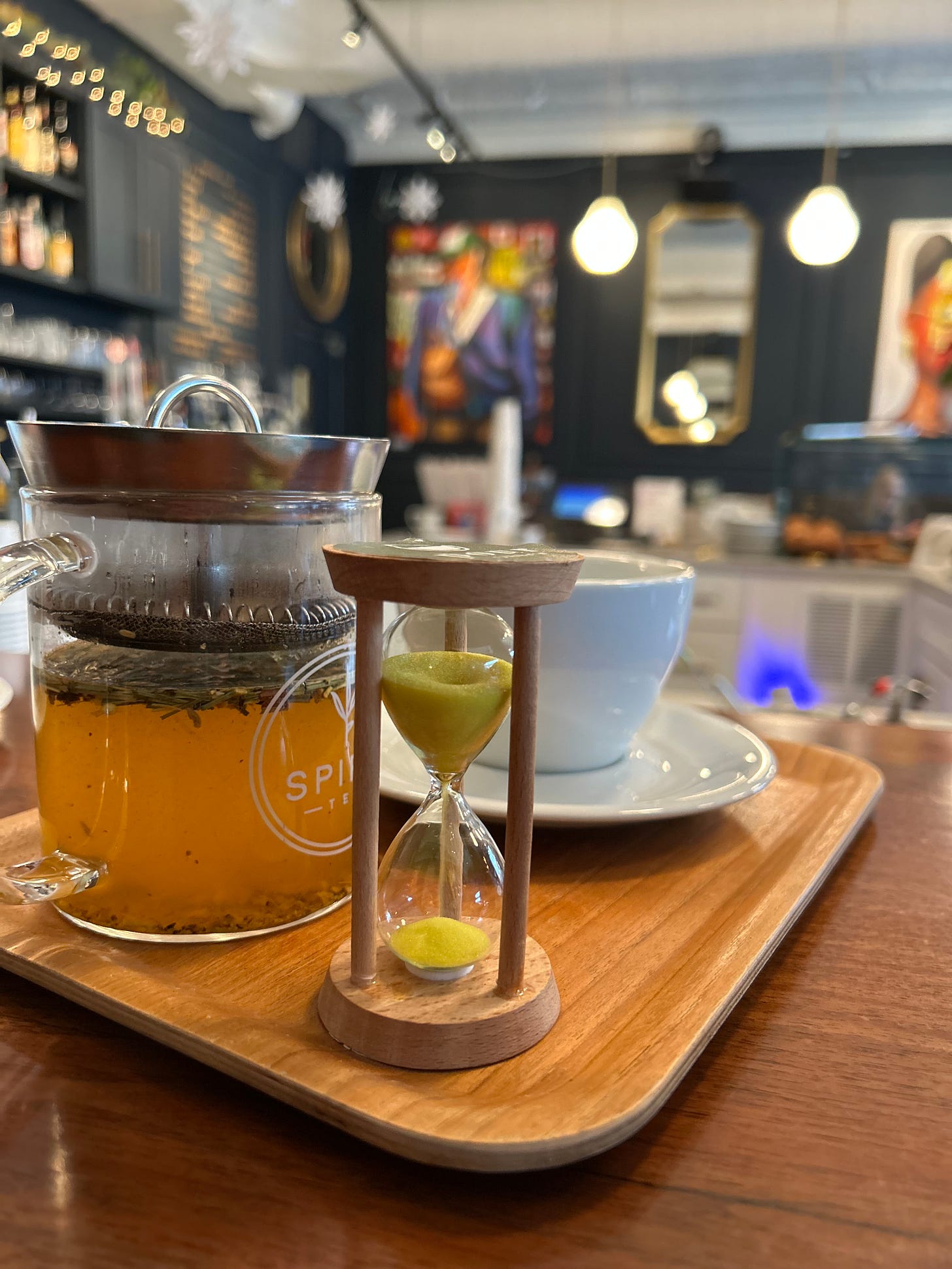
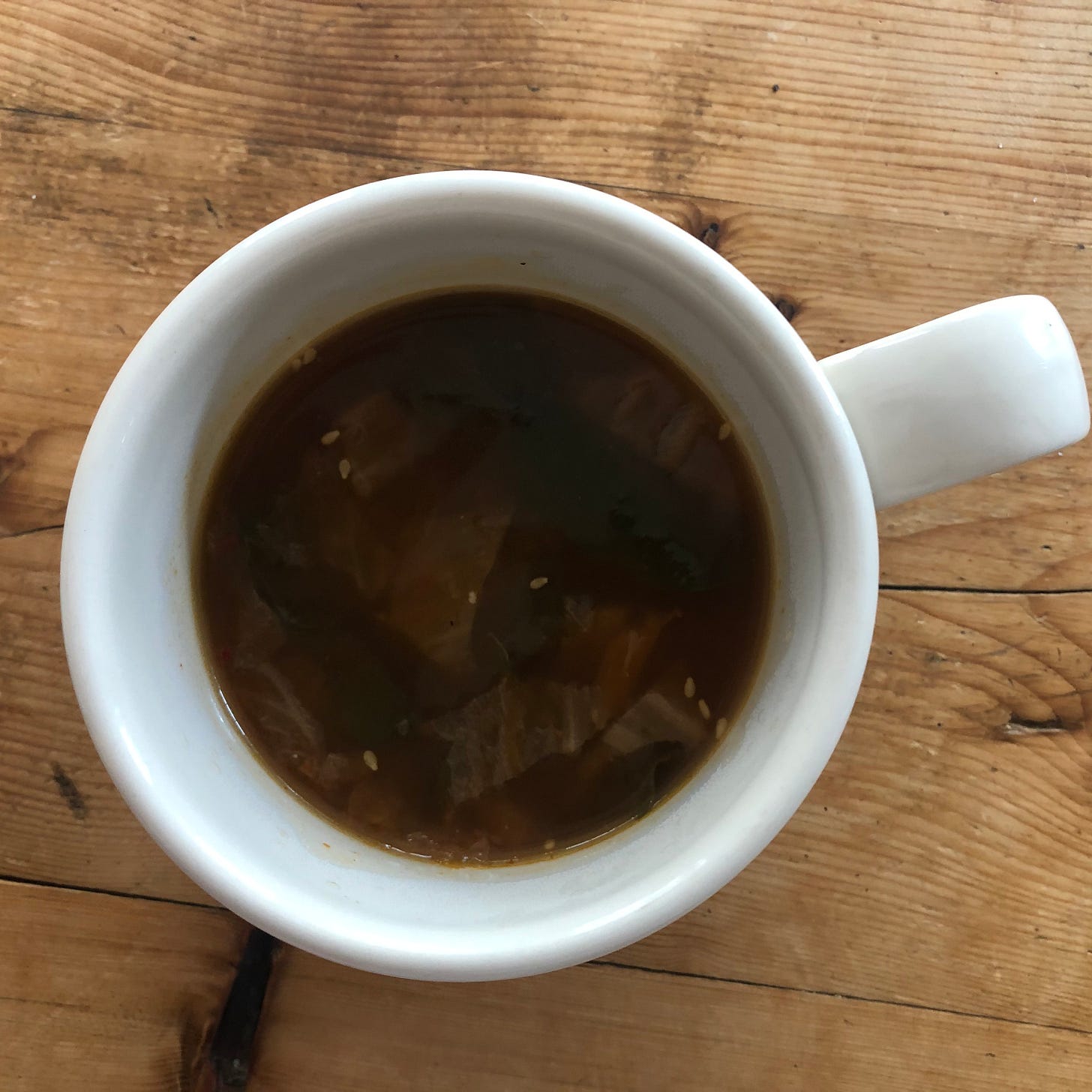
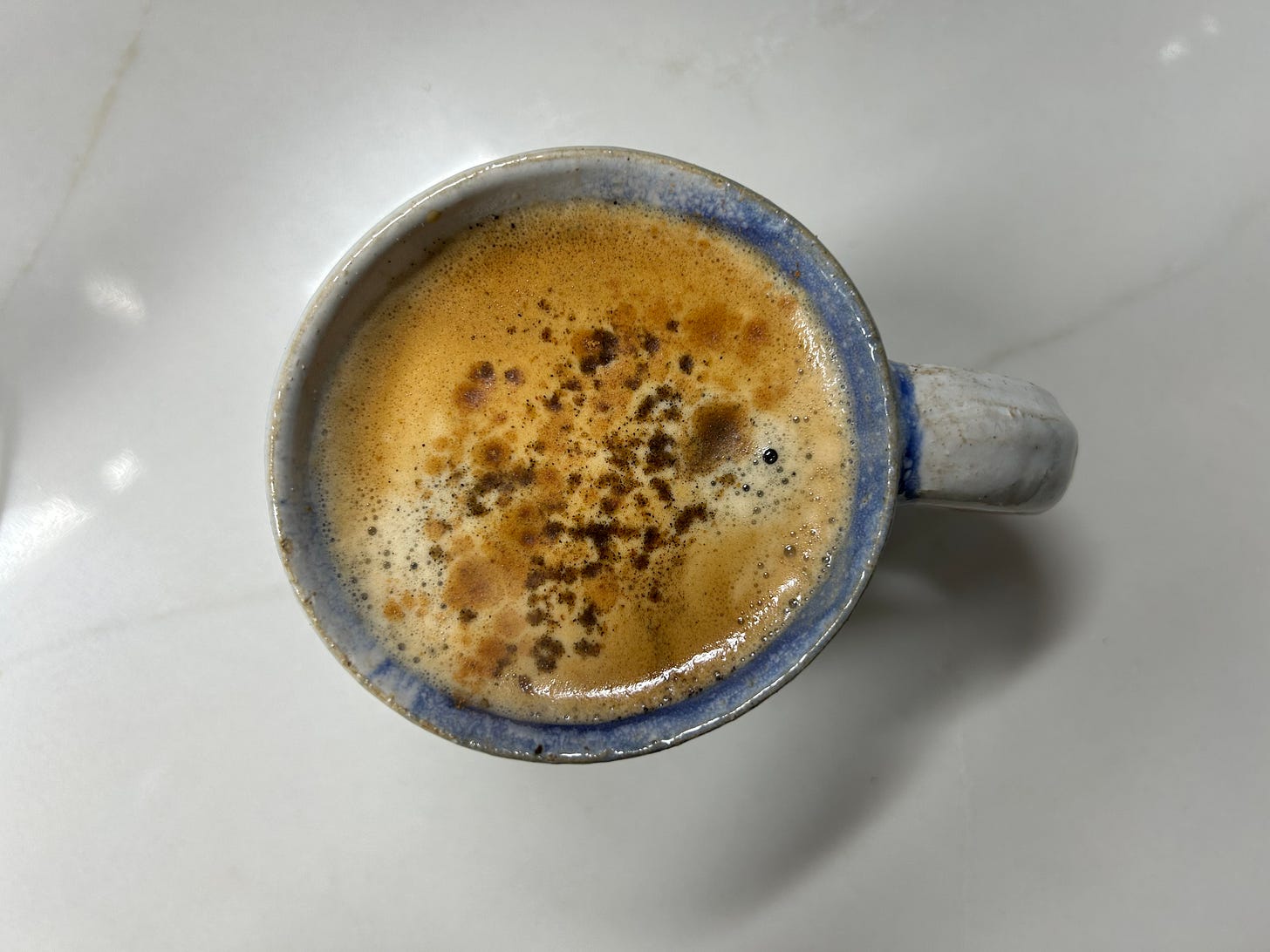
Thank you for this great information! I definitely plan to incorporate some of these into my daily routine!
hi, Savitree! Thanks for this list. Sometimes I drink warm water in the morning with a bit of lemon. What's the difference between adding a squeeze of lemon vs ACV? Also, I think I remember a post about how to pack efficiently, but I did a search and can't seem to find it. Am I mis-remembering? Thank you!!